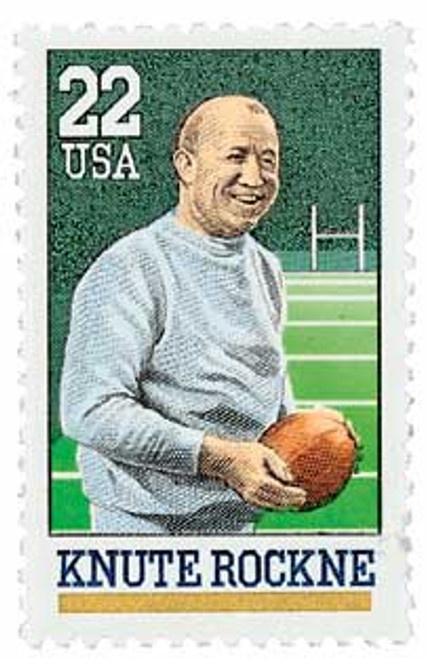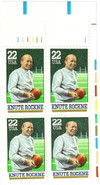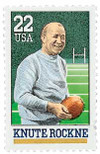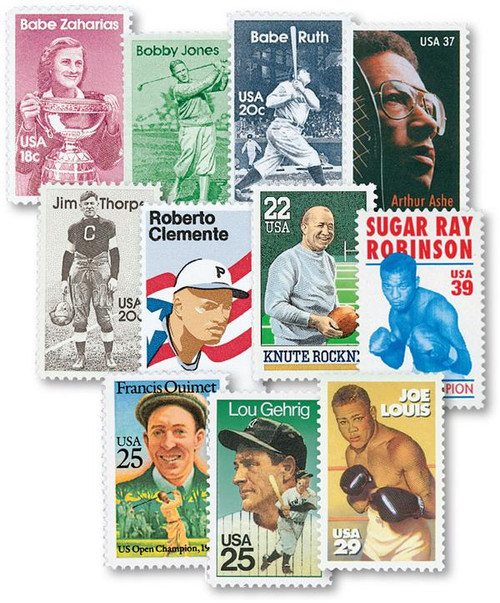
# 2376 - 1988 22c Knute Rockne
U.S. #2376
1988 22¢ Knute Rockne
American Sports Series
- Issued five days after Rockne’s 100th birthday
- 6th stamp in American Sports Series
- President Ronald Reagan, who appeared in movie about Rockne’s life, participated in First Day ceremony
Stamp Category: Commemorative
Series: American Sports
Value: 22¢, first-class rate
First Day of Issue: March 9, 1988
First Day City: Notre Dame, Indiana
Quantity Issued: 97,300,000
Printed by: Bureau of Engraving and Printing
Printing Method: Lithographed and engraved
Format: Panes of 50 in sheets of 200
Perforations: 11
Why the stamp was issued: To commemorate Knute Rockne’s 100th birthday.
About the stamp design: The USPS received a variety of photos from Notre Dame University, and a few were sketched into stamp designs. One showing Rockne in a business hat was criticized for closely resembling Al Capone. Another of the football coach in a sweatshirt was also unpopular with the committee. The USPS then asked the Bureau of Engraving and Printing to take the project over. BEP designer Peter Cocci and engraver Thomas Hipschen worked together on a design based on a photo of Rockne smiling and holding a football.
Special design details: The gold bar and blue lettering at the bottom of the stamp are Notre Dame’s school colors.
First Day City: The First Day ceremony for this stamp was held in the filed house of Notre Dame University in Notre Dame, Indiana. President Ronald Reagan was a guest speaker at the ceremony. He had played Notre Dame football player George Gipp in in the film about Rockne’s life, Knute Rockne, All American.
Unusual fact about this stamp: This stamp design was reproduced on tickets for all Notre Dame home games in the fall of 1988.
About the American Sports Series: On September 22, 1981, the USPS inaugurated its Sports Series (sometimes called the American Sports Personalities Series), honoring some of America’s most notable athletes. The series ran until 2013 and honored notable athletes from a variety of sports including golf, baseball, tennis, football, and boxing. Click here to get the complete series.
History the stamp represents: Knute Rockne was born Knut Larsen Rockne on March 4, 1888, in Voss, Norway. Rockne’s family moved to Chicago when he was five and he spent his childhood in the Logan Square section of the city. It was here he first learned to play football and eventually played end for the Logan Square Tigers. In high school, Rockne played football and ran track.
After high school, Rockne spent four years working as a mail dispatcher for the Chicago Post Office. Once he saved enough money, he went to Notre Dame to study chemistry. While there he continued to play end and won All-American honors in 1913.
On November 1 of that year Rockne also played an important game that would change the way college football was played. Facing off against West Point, Notre Dame’s quarterback threw accurate downfield passes to Rockne to help win the game 35 to 13. While it wasn’t the invention of the forward pass, it was the first significant game in which the pass was effectively used several times.
Rockne graduated from Notre Dame in 1914 with a degree in pharmacy. He briefly worked as a lab assistant until he got the chance to play professional football. He began his career with the Akron Indians playing both end and halfback. Then in 1915 he went to play with the Massillon Tigers, where he helped make the forward pass part of professional football.
In 1918, Rockne took over as coach of the Notre Dame “Fighting Irish” football team. Over the next 13 years, his team won 105 games, lost only 12, and tied 5, giving him a career winning percentage of .881 – the highest in college football history. Under his direction as head coach, the famous “Fighting Irish” saw five unbeaten, untied seasons.
Rockne was as brilliant off the field as he was on it. He recognized that college football could be a real moneymaker and worked hard to make money for the team and school. He charmed the media to get free advertising and even found success as a spokesman for a local Studebaker dealership, among other products.
Rockne also coached Notre Dame’s legendary Four Horsemen. Supported by the “Seven Mules” linemen, the Four Horsemen, quarterback Harry Stuhldreher, halfbacks Don Miller and Jim Crowley, and fullback Elmer Layden, lost only two of the 30 games they played from 1922-24. Their final victory was in the Rose Bowl – college football’s oldest and perhaps most prestigious bowl game.
Sportswriter Grantland Rice coined the name for a 1924 article. After Rice’s article was printed, publicity aide George Strickler came up with a photo to promote the players’ reputations as the “Four Horsemen.” The players were shown dressed in their football uniforms mounted on four horses from a local stable. This photograph was featured in newspapers across the country and helped to popularize their legendary status.
Then, in late March 1931, Rockne was on a trip to film The Spirit the Notre Dame. The wings of the plane he was flying on broke, leading it to crash in Kansas, killing Rockne and seven others. Rockne’s death became national news and President Herbert hoover called it “a national loss.” His death also led to a public inquiry and major changes to the aviation industry, turning it into one of the safest forms of travel.
U.S. #2376
1988 22¢ Knute Rockne
American Sports Series
- Issued five days after Rockne’s 100th birthday
- 6th stamp in American Sports Series
- President Ronald Reagan, who appeared in movie about Rockne’s life, participated in First Day ceremony
Stamp Category: Commemorative
Series: American Sports
Value: 22¢, first-class rate
First Day of Issue: March 9, 1988
First Day City: Notre Dame, Indiana
Quantity Issued: 97,300,000
Printed by: Bureau of Engraving and Printing
Printing Method: Lithographed and engraved
Format: Panes of 50 in sheets of 200
Perforations: 11
Why the stamp was issued: To commemorate Knute Rockne’s 100th birthday.
About the stamp design: The USPS received a variety of photos from Notre Dame University, and a few were sketched into stamp designs. One showing Rockne in a business hat was criticized for closely resembling Al Capone. Another of the football coach in a sweatshirt was also unpopular with the committee. The USPS then asked the Bureau of Engraving and Printing to take the project over. BEP designer Peter Cocci and engraver Thomas Hipschen worked together on a design based on a photo of Rockne smiling and holding a football.
Special design details: The gold bar and blue lettering at the bottom of the stamp are Notre Dame’s school colors.
First Day City: The First Day ceremony for this stamp was held in the filed house of Notre Dame University in Notre Dame, Indiana. President Ronald Reagan was a guest speaker at the ceremony. He had played Notre Dame football player George Gipp in in the film about Rockne’s life, Knute Rockne, All American.
Unusual fact about this stamp: This stamp design was reproduced on tickets for all Notre Dame home games in the fall of 1988.
About the American Sports Series: On September 22, 1981, the USPS inaugurated its Sports Series (sometimes called the American Sports Personalities Series), honoring some of America’s most notable athletes. The series ran until 2013 and honored notable athletes from a variety of sports including golf, baseball, tennis, football, and boxing. Click here to get the complete series.
History the stamp represents: Knute Rockne was born Knut Larsen Rockne on March 4, 1888, in Voss, Norway. Rockne’s family moved to Chicago when he was five and he spent his childhood in the Logan Square section of the city. It was here he first learned to play football and eventually played end for the Logan Square Tigers. In high school, Rockne played football and ran track.
After high school, Rockne spent four years working as a mail dispatcher for the Chicago Post Office. Once he saved enough money, he went to Notre Dame to study chemistry. While there he continued to play end and won All-American honors in 1913.
On November 1 of that year Rockne also played an important game that would change the way college football was played. Facing off against West Point, Notre Dame’s quarterback threw accurate downfield passes to Rockne to help win the game 35 to 13. While it wasn’t the invention of the forward pass, it was the first significant game in which the pass was effectively used several times.
Rockne graduated from Notre Dame in 1914 with a degree in pharmacy. He briefly worked as a lab assistant until he got the chance to play professional football. He began his career with the Akron Indians playing both end and halfback. Then in 1915 he went to play with the Massillon Tigers, where he helped make the forward pass part of professional football.
In 1918, Rockne took over as coach of the Notre Dame “Fighting Irish” football team. Over the next 13 years, his team won 105 games, lost only 12, and tied 5, giving him a career winning percentage of .881 – the highest in college football history. Under his direction as head coach, the famous “Fighting Irish” saw five unbeaten, untied seasons.
Rockne was as brilliant off the field as he was on it. He recognized that college football could be a real moneymaker and worked hard to make money for the team and school. He charmed the media to get free advertising and even found success as a spokesman for a local Studebaker dealership, among other products.
Rockne also coached Notre Dame’s legendary Four Horsemen. Supported by the “Seven Mules” linemen, the Four Horsemen, quarterback Harry Stuhldreher, halfbacks Don Miller and Jim Crowley, and fullback Elmer Layden, lost only two of the 30 games they played from 1922-24. Their final victory was in the Rose Bowl – college football’s oldest and perhaps most prestigious bowl game.
Sportswriter Grantland Rice coined the name for a 1924 article. After Rice’s article was printed, publicity aide George Strickler came up with a photo to promote the players’ reputations as the “Four Horsemen.” The players were shown dressed in their football uniforms mounted on four horses from a local stable. This photograph was featured in newspapers across the country and helped to popularize their legendary status.
Then, in late March 1931, Rockne was on a trip to film The Spirit the Notre Dame. The wings of the plane he was flying on broke, leading it to crash in Kansas, killing Rockne and seven others. Rockne’s death became national news and President Herbert hoover called it “a national loss.” His death also led to a public inquiry and major changes to the aviation industry, turning it into one of the safest forms of travel.









